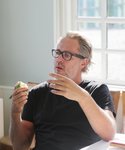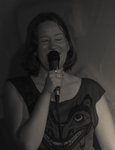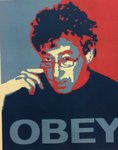
Morten Nielsen (Principal Investigator) is an associate professor at Aarhus University. He will be responsible for the administration of the project, for conducting one subproject and for the theoretical integration of its findings. His subproject Comic at the Core: Exploring the Ludic Digressions of Stand-up Comedy is an ethnographic study of digression as playfulness among stand-up comedians in New York, USA; in particular, it focuses on stand-up comedians’ timing and ability to move from subject to subject while making seemingly unrelated topics appear connected. Based on participant observation, interviews and visual and textual analyses, the project contributes insights into the ludic and temporal qualities of digression.
More information on Morten Nielsen's work can be found on his personal website.

Marianna Keisalo is a post-doctoral researcher at Aarhus University. Her subproject Digression Doubled: Stand-Up Comedy as Coordinated Trickery is an ethnographic study of digression as a creative force exploring how stand-up comedy interacts with its cultural and social contexts in efficacious and potentially transformative ways. As both a frame for action and a kind of action, stand-up comedy involves digression on several levels. It is first a digression from everyday life into a performance situation where the actions and expectations of comedians and audiences are calibrated on and geared towards laughter. Once this frame is in place, another layer of digression is possible – even necessary – in order to reach the shared goal of laughter in a satisfying and effective way, whether by providing new perspectives on social life to question accepted notions, or by deviating from the conventions of the genre itself to renew comedy. Based on participant-observation (including becoming an amateur comedian), interviews, and semiotic analysis of stand-up comedy in Finland, this project will contribute insight into the creative and transformative qualities of digression.

John Limon, John J. Gibson Professor of English at Williams College, is the author of The Place of Fiction in the Time of Science (Cambridge), Writing After War (Oxford), Stand-Up Comedy in Theory (Duke), and Death's Following (Fordham). His current project is a study of "escapism" in literature and film. His study begins with these questions: what does it mean to say that a work is escapist? what is it escaping from? what is the relation of escapism to actual, sometimes existentially required, escape? what is the relation of escapism to Utopianism? what is the relation of escapism to globalization? These questions are meant to challenge the self-evidence of the binarism center/ digression: the escapist work attempts to stay home, to escape not its place but the unlovability of its place; thus it entails an evasion that keeps everything centered.

Nigel Rapport is a professor at St Andrews University (UK). His subproject, Life-Affirming: The Digressive Practice of Art Appreciation, is an ethnographic study of digression as an aesthetic phenomenon. Based on participant observation, interviews and textual analyses among aficionados of the British painter Stanley Spencer (1891-1959), the project contributes insights into the affective qualities of digression; in particular the apparently impractical and diversionary activities of art-appreciation afford resources, mental and emotional, for affirming daily life. Rapport’s work to connect anthropology to philosophy, literature and art in an exploration of the universality and the individuality of human being--in particular his emphasis on the capacities of the imagination and the circuitous nature of social life--makes his presence in the project-team crucial.

Mathias Nordvig is a visiting Assistant Professor at University of Colorado, Boulder (USA). His subproject, Explaining Poetry in Old Norse: Mythical Digressions in Snorri’s Edda Saxo’s Gesta Danorum, is a discursive study of digression as a principle of cosmological narration in pre-Christian myths in the 13th century, as recounted by the Icelandic mythographer Snorri Sturluson and Danish historian Saxo Grammaticus. Based on textual analysis of narrative patterns in the text’s dialogic form, this project contributes insights into the quality of digression as means by which pre-Christian mythic tropes, themes and cosmological principles continued to endure in medieval Christian texts in the North by syncretically enfolding themselves within the latter. If funded, Mathias Nordvig will become post doctoral research fellow at Aarhus University.
Birgitte Beck Pristed is an assistant professor at Aarhus University. Her subproject: Eternal Deviation: Digression in Russian Allegorical Opposition examines digression as a discourse of political subversion. Based on textual analysis of selected Russian fictional texts, the project contributes insights into the oppositional and political qualities of digression. Russian classics from Pushkin to Chekhov employ several well-researched examples of digression as narrative strategy. Under Soviet totalitarian repression, the Russian intelligentsia refined the literary technique of Aesopian fable or fabulation, or the art of being indirect, which became an escape strategy within academic communication. But a current tendency toward an alternative re-telling of Soviet history, as a digression within the grand narrative of Imperial Russia, may also be observed.